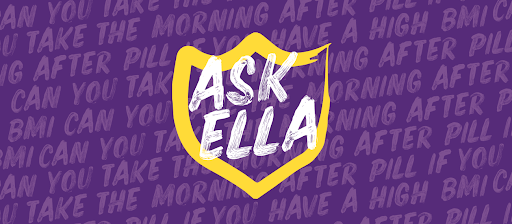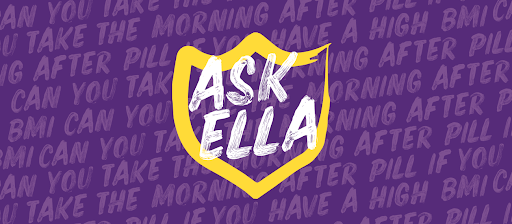Have you ever experienced a contraceptive failure? If so, you’re not alone. In HRA’s (the manufacturers of ellaOne®) recent survey, they found that 59% of respondents have had at least one contraceptive failure in their lives.
If this happens to you, you may have a lot of questions running through your mind. “Am I at risk of pregnancy?”, “Should I get the morning after pill”, and perhaps “Will the morning after pill work for me”?
There is a lot of misinformation and confusion floating around about the morning after pill, so it’s our job to give you the facts to reassure you and help you make an informed decision. One of the things we’ve been hearing a lot recently is the idea that the morning after pill is less effective for women and people with uteruses who have a body mass index (BMI) of 26 or higher.
We know there’s a bit of confusion about this topic, so we spoke to Deborah Evans, a pharmacist with over 30 years of experience*, to get the facts.
*Deborah Evans does not endorse any products or brands.
What is BMI?
Your BMI is a measurement that uses your height and weight to calculate if your weight is in a healthy range. The BMI calculation divides an adult’s weight in kilograms by their height in metres squared. You can calculate your BMI here.
For most adults, a ‘healthy’ BMI is estimated to be between the 18.5 to 24.9 range. Anything below 18 is considered underweight. A BMI of between 25-29 is considered overweight, and a BMI of 30 or higher is obese.
It’s important to note that everyone’s natural body weight is different and that what is healthy to one person can look different to another. The BMI just calculates weight, which means everything that makes up your weight – not just fat. Muscle weighs more than fat, which is why some athletes and weight lifters may be a healthy weight for their activity range whilst technically having an obese BMI.
Having a lower BMI doesn’t necessarily mean you’re healthy, and having a higher BMI doesn’t mean you’re unhealthy. What’s really important is that you feel healthy in your body, that you are able to do the activities you enjoy and that you are enjoying a healthy and balanced diet.
Is the morning after pill suitable for people with a BMI of 25 or above?
The morning after pill helps reduce the risk of unplanned pregnancy following contraceptive failure or unprotected sex by delaying ovulation, so the egg is not released and any sperms that are in your vagina won’t have anything to fertilise.
Regardless of your body weight or BMI, you should take emergency contraception as soon as possible after unprotected sex in order to reduce the risk of unplanned pregnancy. Your emergency contraceptive options are the hormonal emergency contraceptive pill (ulipristal acetate, the active ingredient in ellaOne®, or levonorgestrel) or the intrauterine device (IUD).
But is emergency contraception less effective if you weigh more?
“There appears to be limited and inconclusive data which suggests that levonorgestrel is less effective in women with a BMI over 26 and/or who weigh over 70 kilogrammes,” says Deborah. “Ulipristal acetate may be less effective in women with a BMI over 30 or weight greater than 85 kilogrammes.”
What little data we have is limited and inconclusive, so it’s really hard to determine causation or say for sure whether a morning after pill would be less effective for someone with a higher BMI. Either way, the advice is that you should take emergency contraception if you have had unprotected sex and you want to avoid unplanned pregnancy. ellaOne® has been clinically proven to be 2.5x more effective** than levonorgestrel when taken within 24 hours.
**verify at ellaone.co.uk/verify
Should people with a higher BMI take a ‘double dose’ of the morning after pill to make it more effective?
If the morning-after pill is less effective for people with higher BMIs, is the solution to double the dose?
Double doses of the morning after pill are an off-license use of the product, as this medication is intended to be taken as a single pill after unprotected sex. A double dose of morning after pills containing ulipristal acetate (i.e. ellaOne®) is not recommended regardless of your weight or BMI.
HRA, the manufacturers of ellaOne®, released the following statement regarding BMI and the morning after pill: “There is no conclusive evidence to suggest that ellaOne® becomes ineffective if the person taking it is above a specific weight. ellaOne® remains effective for all eligible women regardless of BMI or weight, and we would not recommend a doubling of the dose in any circumstance. Double dosing of EHC [emergency hormonal contraception] is an off-label use and is technically an overdose.”
If you have any concerns, you should discuss them with a doctor or pharmacist who will be able to answer your questions and help you make an informed decision.
Is the IUD an emergency contraceptive?
“The clinical recommendation from the Faculty of Reproductive Health is that women should be informed that the copper IUD is the most effective method of emergency contraception,” says Deborah.
The IUD is a T shaped plastic and copper device that is inserted into your womb by a medical professional. The IUD is effective as an emergency contraceptive for up to 5 days after unprotected sex, and it also works as a long-term contraceptive. There is no evidence that the IUD is less effective if you weigh more, and it can be used as a long-term method of contraception after it is inserted.
—
Regardless of your weight, the advice is to take emergency contraception after unprotected sex or contraceptive failure to help avoid unplanned pregnancy. If you have any concerns, speak to a pharmacist or doctor who will be able to advise you.
Accidents happen and they’re nothing to be ashamed of – what’s important is that you have the facts so you can make an informed decision about your body. Have you ever taken the morning after pill? Why not share your experience by clicking the button below.
*Deborah Evans does not endorse any products or brands.
ellaOne® 30mg film-coated tablet contains ulipristal acetate and is indicated for emergency contraception within 120 hours (5 days) of unprotected sexual intercourse or contraceptive failure.







